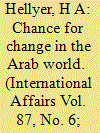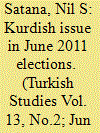| Srl | Item |
| 1 |
ID:
108410


|
|
|
|
|
| Publication |
2011.
|
| Summary/Abstract |
As the largest Arab country, Egypt has always played a crucial role in the politics of the Arab world; however, the internal political dynamics of Egypt have until the January 2011 uprising hardly attracted a glance from international observers. This article gives an overview of the political arena and the various political forces at play in post-Mubarak Egypt. With many unpredictable variables currently at play in Egyptian politics, the result of the elections scheduled for November 2011 will likely surprise many, both within the country and beyond. The article also looks at what impact the political changes in Egypt may have had on the relationship between Egypt and Israel. There have been increasingly frequent demands within Egypt to revise the Camp David accords-but not at the expense of war with Israel. While Israel is unlikely to accept any calls to revise the peace treaty, Arab public opinion has become newly relevant for policy-makers and Israel will have to make corresponding adjustments to its regional security strategy.
|
|
|
|
|
|
|
|
|
|
|
|
|
|
|
|
| 2 |
ID:
114237


|
|
|
|
|
| Publication |
2012.
|
| Summary/Abstract |
When the 2011 parliamentary election campaign started, Turkish political parties promised to draft a new constitution in their manifestos. Not surprisingly, after the election, the political parties that gained representation in parliament reiterated this promise to their constituents. Furthermore, hopes for a new constitution have increased with the beginning of the legislative session because the above-mentioned political parties have agreed to join the negotiation process without presenting any pre-conditions. However, each party has its own agenda and hopes for a new constitution might collapse when these agendas appear during the negotiation process.
|
|
|
|
|
|
|
|
|
|
|
|
|
|
|
|
| 3 |
ID:
114238


|
|
|
|
|
| Publication |
2012.
|
| Summary/Abstract |
This article analyzes the Kurdish issue in various aspects before the June 2011 elections. The main research questions include what constitutes the major grievances of the Kurds; how the ongoing conflict is framed as "Kurdish issue" versus a "terrorism problem" and how major political parties in Turkey approach the issue and its solution in their 2011 election manifestos and rallies. This article contributes the literature on the Kurdish issue in particular and Turkey's democratic consolidation in general by identifying the problems and political views of all relevant sides. Finally, based on both a historical and empirical analysis, the article reflects on the reasons why the Adalet ve Kalkinma Partisi and Baris ve Demokrasi Partisi have become the major players in addressing the Kurdish issue after the 2011 election. The findings are relevant for Turkish democratic consolidation in particular and the democratization literature in general.
|
|
|
|
|
|
|
|
|
|
|
|
|
|
|
|